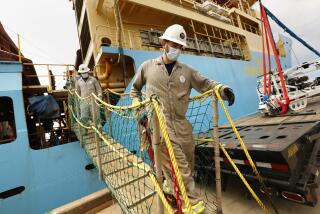How you can turn the tide
- Share via
EACH OF US MAKES choices every day that can harm the ocean or help turn the tide. If you want to help, consider the following actions:
Eat right. What you eat and how it is grown make a difference. Fertilizers used on crops in the Midwest wash into the Mississippi River, where they eventually reach the Gulf of Mexico and contribute to algae blooms and oxygendepleted “dead zones.” Pesticides also contaminate marine environments. Animal wastes from huge feedlots can harm sea grasses, coral reefs and other coastal ecosystems. Buying locally grown organic food and reducing the amount of meat you eat can have an effect on all these problems.
Clean up your household trash. Sooner or later, harmful materials you throw away will leach out of landfills and into the planet’s water system, where they concentrate in plankton, a food source for fish and, ultimately, you and me. Use baking soda, vinegar, lemon juice and water as cleaning agents. Turn in household batteries, computers and other appliances containing harmful components to a recycling center or other hazardous waste disposal site.
Use less plastic. Plastic objects make up about 60% of the trash found on the beaches and about 90% of the debris found floating in the oceans worldwide. If you take plastic to the beach, take it home with you. Buy from bulk bins and reuse containers. Use canvas tote bags instead of shopping bags.
Don’t treat storm drains like a toilet. When you drop gum, paper, cigarette butts or anything else on the pavement or into drains, it’s likely to land in a river, wetland or the ocean. If you use chemicals on your lawn, don’t spray them on a windy day or just before you water, when they’re more likely to end up as runoff.
Pick up after your pet. About 15 tons of pet waste end up in our oceans every day, adding pathogens and bacteria that sicken marine life and people.
Drive a fuel-efficient car; carpool, walk or bike when you can; use public transit. Coastal waters are poisoned not only from land-based runoff but also from tailpipe pollutants contributing to nitrogen buildup in offshore waters -- another factor in creating dead zones. Fossil fuel-driven climate change also is affecting the ocean -- bleaching and killing corals, increasing water levels, water temperatures, water acidity, erosion and storm surges.
Keep oil off our shores. With rising oil and gas prices, Washington politicians are pushing to reopen longprotected offshore waters to oil drilling, a prescription for devastating oil spills.
Conserve electricity. Most U.S. power plants still burn coal, the oldest and most polluting fossil fuel, in order to produce electricity. Coal plants release sulfur dioxide, which causes acid rain, and nitrogen oxide, which contributes to algae blooms. Coal-burning power plants also release mercury, a neurotoxin that builds up in the flesh of tuna, swordfish and other large ocean predators and poses a health risk to marine life and seafood consumers.
Vote for the oceans. Retired Adm. Jim Watkins, chairman of the nowdefunct U.S. Commission on Ocean Policy, has warned that we may have only five to 10 years left to save our oceans. Still, the White House and Congress take a wait-and-see attitude. Let your elected representatives know that how they treat the coast and the ocean will influence your vote.


